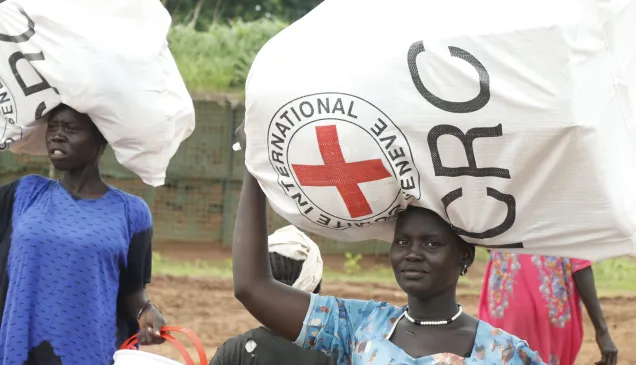Refugees and displaced persons protected under international humanitarian law
Refugees are people who have crossed an international frontier and are at risk or have been victims of persecution in their country of origin. Internally displaced persons (IDPs), on the other hand, have not crossed an international frontier, but have, for whatever reason, also fled their homes.
Refugee law – mainly the 1951 Convention Relating to the Status of Refugees and the Convention Governing the Specific Aspects of Refugee Problems in Africa - and the mandate of the Office of the United Nations High Commissioner for Refugees (UNHCR) provide the main framework for protection and assistance for refugees. Refugees are also protected by general human rights law, and if they find themselves in a State involved in armed conflict, by international humanitarian law.
The general provisions of IHL protect civilian refugees in States involved in armed conflict, but they also receive special protection under the Fourth Geneva Convention and Additional Protocol I. This additional protection recognizes the vulnerability of refugees as aliens in the hands of a party to a conflict.
Internally Displaced Persons
There is no convention for IDPs equivalent to the 1951 Refugee Convention. Nonetheless, international law protects persons from displacement and once they are displaced under several bodies of law: - IDPs are protected by international human rights law and domestic law; - In situations of armed conflict, they are protected by IHL; - The Guiding Principles on Internal Displacement, which are based on these two bodies of law, provide useful guidance on displacement-specific aspects.
Under IHL, people are protected from and during displacement as civilians, provided they do not take a direct part in hostilities.
IHL plays an important part in preventing displacement in the first place. It prohibits the displacement of people except if it is necessary for imperative military reasons or the protection of the civilians themselves. A widespread or systematic policy of displacement of civilians without such justification constitutes a crime against humanity.
Several rules of IHL protect the civilian population and their violation often constitutes a root cause of displacement. For instance, attacks by parties to an armed conflict on civilians and civilian objects are forbidden, as are indiscriminate methods of warfare that may have an adverse impact on civilians. Other rules whose respect will prevent displacement include the prohibition of acts that threaten the civilian population's ability to survive such as destruction, without valid military reason, of crops, health facilities, water and power supplies or dwellings.
Collective punishment of civilian populations is also outlawed under IHL.
Humanitarian Relief
International humanitarian law guarantees access for relief and humanitarian organizations to refugees and IDPs in situations of armed conflict. Parties to a conflict must facilitate the supply of relief materials such as medicines, food, blankets and tents.
Regrettably these rules have been ignored in many recent conflicts putting both refugee populations and IDPs in danger. The ICRC has consistently called on States and non-State armed groups to respect and ensure respect for international law and the basic principles of humanity when dealing with civilians. Only through respect of the rules of armed conflict can refugee flows and internal displacement be prevented; similarly, if people have to leave their homes, they can only be protected if IHL is complied with.



